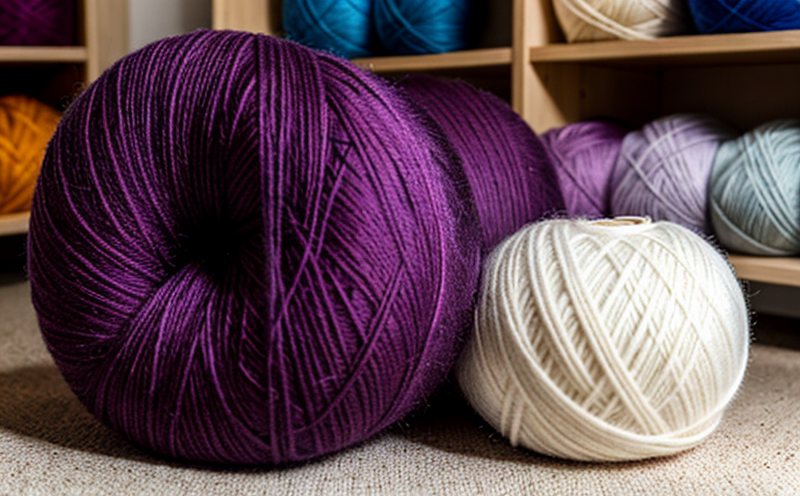ASTM D5035 Strip Tensile Testing of Yarns and Fabrics
ASTM D5035 is a widely recognized standard for the strip tensile testing of yarns and fabrics. This test measures the force required to cause failure along the lengthwise direction, which is critical for understanding the mechanical properties of textiles.
The ASTM D5035 method involves cutting strips from the fabric or yarn, clamping them between grips, and stretching until they fail. The measurement of the maximum load before failure provides valuable insights into the strength and durability of the material. This information is essential for quality assurance, R&D, and compliance with international standards.
The test setup typically includes a tensile testing machine capable of applying controlled force to the sample. Preparing the samples involves careful cutting along the lengthwise grain using precise tools, ensuring that each specimen represents typical fabric or yarn properties accurately.
Understanding the importance of this testing method is paramount for industries like automotive, aerospace, and general textiles. In the automotive sector, for instance, durability under stress is crucial for safety and performance. Aerospace applications demand materials capable of withstanding extreme conditions, making tensile strength a critical factor in material selection.
The ASTM D5035 test results can influence decisions on raw material sourcing, process optimization, and product design. For compliance officers, it ensures adherence to industry standards and regulatory requirements. R&D teams use these tests as a baseline for innovation, helping them develop stronger, more resilient materials.
With the increasing demand for sustainable materials, understanding how different yarns behave under stress is essential. This knowledge helps in selecting eco-friendly alternatives that meet both performance and environmental goals. The test also aids in comparing synthetic fibers with natural ones to find the best balance of properties.
The ASTM D5035 method has been instrumental in advancing textile technology, providing a standardized approach for evaluating yarns and fabrics. This ensures consistency across different manufacturers and laboratories worldwide, enhancing trust and reliability in textile products.
- Competitive Advantage: Understanding the exact tensile strength of materials allows companies to optimize product performance, reduce costs through efficient design, and stay ahead of regulatory changes.
- Market Impact: Consistent testing ensures that all market participants are working with standardized metrics, reducing variability in quality and improving overall industry standards.
In conclusion, ASTM D5035 is a cornerstone method in the textile industry. It provides critical data for decision-making processes, supports compliance efforts, and drives innovation towards more robust materials.
Why It Matters
The importance of ASTM D5035 cannot be overstated, especially given its role in ensuring product quality and reliability across various industries. In the automotive sector, for example, tensile strength is a key factor in determining the safety of components such as seat belts and harnesses.
For aerospace applications, materials must withstand high stress without failure, making this test indispensable in selecting appropriate textiles for aircraft interiors or structural components. The results from ASTM D5035 are also crucial for general textiles like clothing, where durability is a selling point.
From an economic perspective, consistent tensile testing ensures that manufacturers can confidently source materials based on proven performance metrics. This reduces the risk of material failures in production and enhances overall product quality.
In terms of compliance, ASTM D5035 helps companies meet regulatory requirements and industry standards. It also supports continuous improvement efforts by providing data for process optimization and new product development.
The test is particularly relevant for R&D teams looking to innovate within the textile sector. By understanding how different yarns behave under stress, they can develop more resilient materials that enhance performance while remaining cost-effective.
For quality managers, compliance officers, and procurement professionals, ASTM D5035 offers a reliable method to ensure product integrity and meet customer expectations. It also supports sustainable practices by aiding in the selection of eco-friendly materials with comparable or superior tensile strength.
Eurolab Advantages
At Eurolab, we are committed to delivering exceptional service and accuracy in textile testing. Our expertise in ASTM D5035 ensures that you receive reliable results every time:
- Comprehensive Testing Capabilities: We offer a full range of textile tests, including tensile strength, tear resistance, and dimensional stability.
- Accurate Instruments: Our state-of-the-art equipment guarantees precise measurements, ensuring consistent results across all samples.
- Dedicated Experts: Our team of experienced professionals provides guidance throughout the testing process, offering expert advice to help you make informed decisions.
- Global Recognition: Eurolab’s certifications ensure that our tests meet international standards and are trusted by leading companies worldwide.
We understand the importance of accurate and timely results in your business. Our commitment to excellence means we provide rapid turnaround times, ensuring you have the data you need when it matters most.
Moreover, Eurolab’s focus on sustainability ensures that our services are environmentally responsible while delivering high-quality results. Whether you’re a small startup or a large corporation, our comprehensive approach and unwavering commitment to quality will exceed your expectations.





